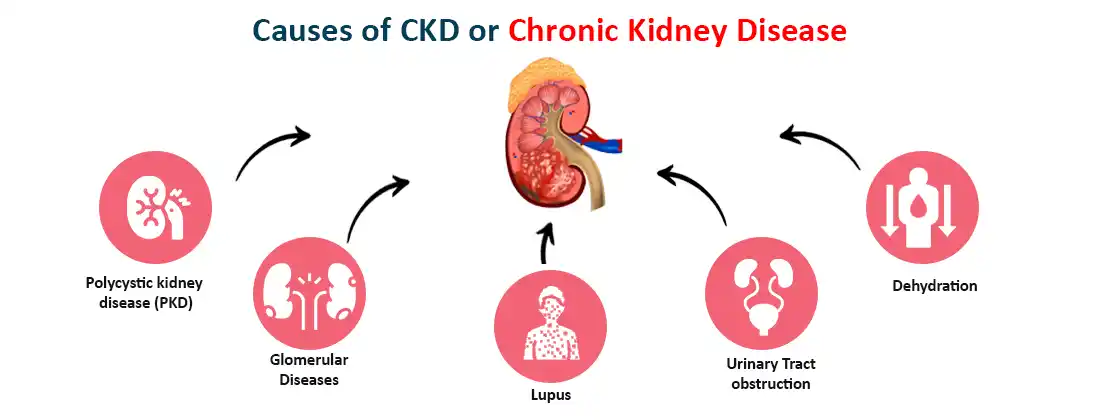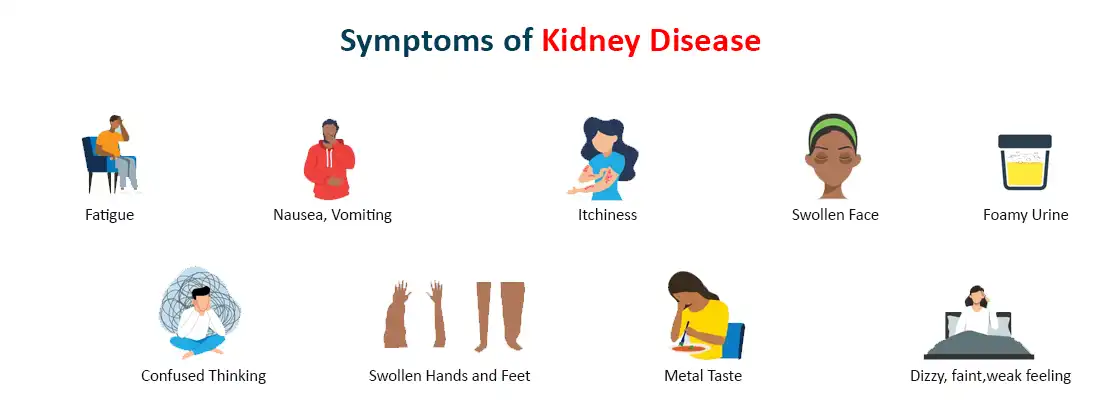
Your Kidneys represent a key to your overall body health. They are located at your bottom of the rib cage. With one present on each side of your spine.
They are in charge of controlling the following: Body's pH, salt, and potassium levels. They generate the hormones that control the synthesis of red blood cells (RBC’s) and blood pressure (BP). Even a type of vitamin D that aids in the body's absorption of calcium is activated by the kidneys.
Your rental system consists of two bean-shaped organs that filter blood and return it to your heart. They are vital to both the digestion of food and your general health.
Key Facts
- Your kidneys have the ability to pump more than 50 gallons of your blood per day.
- Sometimes, it is also seen your kidneys could be a replacement for other organs
- Kidneys have the ability to generate vitamin D in your body. This function is usually performed by the skin when it is exposed to sunlight. However, if your skin fails to fulfill its task, it falls on the liver to do it, and if your liver fails, the kidneys take over.
What is Chronic Kidney Disease?
Chronic kidney disease, also called Chronic Kidney Failure.
A progressive loss of kidney function is a feature of chronic kidney disease, commonly known as chronic kidney failure. Urine is the result of your kidneys filtering wastes and extra fluid from your blood.
Early Stage Chronic Kidney Disease
You may not have many symptoms or indicators when chronic kidney disease is first developing. It's possible that renal illness won't become apparent to you until it's well advanced.
Progression: Without mechanical filtering (dialysis) or a kidney transplant, end-stage renal failure—which is deadly—can result from chronic kidney disease.

What are the Causes of Kidney Diseases?
Acute Kidney Disease
If your kidneys suddenly stop working, doctors call it acute kidney injury or acute renal failure. The main causes are:
- Less Flow to kidneys
- Damage to kidneys
- Urine backed up in kidneys
- Traumatic Injury with blood loss
Are dehydrated or your muscle tissue breaks down, sending too much kidney-toxic protein into your bloodstream
Shock followed by Sepsis
Chronic Kidney Disease
Causes of chronic kidney disease: Chronic renal disease is the medical term for kidney failure that lasts longer than three months. Early on, you might not have any symptoms, but it's easier to treat at that point.
The most frequent causes are excessive blood pressure and diabetes (types 1 and 2). Over time, high blood sugar levels might damage your kidneys.
Additionally, high blood pressure creates wear and tear on your blood vessels, including those that go to your kidneys.
Birth defects can damage the kidneys or obstruct the urinary tract. Among the most prevalent ones is a valve of some sort that connects the urethra and bladder. These issues, which can be discovered while the infant is still in the womb, are frequently fixed surgically by an urologist.
Other causes of CKD or Chronic Kidney Disease are as follows:
- Polycystic kidney disease (PKD)
- Glomerular Diseases
- Lupus
- Urinary Tract obstruction
- Dehydration
- Medications
- Untreated systemic diseases example- liver and heart disease
Relation between Alcohol and Kidney Diseases
Alcohol and other dangerous drugs are filtered out of your blood by your kidneys. Drinking causes your kidneys to work harder to filter waste products from your body.
Your risk of having chronic kidney disease can rise if you regularly consume large amounts of alcohol. The risk of high blood pressure, which is frequently the cause of kidney disease, might rise even if you just have 2 alcoholic drinks each day. Alcohol use can also interfere with hormones that support renal function.
What are Kidney Stones?
Kidney stones or Renal Caliculi are hard deposits consisting of minerals and salts that develop inside your kidneys. They are sometimes referred to as renal calculi, nephrolithiasis, or urolithiasis.
Kidney stones can have many different causes, including diet, obesity, certain medical disorders, and certain vitamins and drugs. Your kidneys, bladder, and other urinary tract organs can all be impacted by kidney stones.

Symptoms of Kidney Diseases
- Fatigue
- Feeling Cold
- Shortness of Breath
- Dizzy, faint, weak feeling
- Confused Thinking
- Itchiness
- Swollen Hands and Feet
- Swollen Face
- Metal Taste
- Ammonia Breath
- Nausea, Vomiting
- Foamy Urine
- Brown, red and even purple urine
- Difficulty urinating
Lower Back ache is usually not associated with Kidney Disease.
Diagnosis and Management
Urine Tests. Alcohol and other dangerous drugs are filtered out of your blood by your kidneys. Drinking causes your kidneys to work harder to filter waste products from your body.
Blood tests. Tests on your blood can reveal how successfully your kidneys filter waste from your blood. A tiny amount of blood will be drawn from a vein in your arm by a healthcare professional using a fine needle. Your blood sample will then be examined by technicians in a laboratory.
Note: The level of creatinine in your blood is determined by a serum creatinine blood test. Your serum creatinine level rises when your kidneys are not functioning properly. Your age, sex, and body mass percentage will determine what normal values are for you.
Further imaging Tests for the kidneys may include:
- KUB
- Kidney Ultrasound
- MRI Kidney
- CT Urogram
Guidelines to follow before, during and after the Kidney Diseases
Here are some guidelines an individual can refer to once they have decided to undergo CKD Test in Ganesh Diagnostic and Imaging Center
The required documents needed for this test includes your valid government ID and an appropriate Doctor’s prescription.
A. Before the test
- Nothing Specific to prepare for Kidney Diseases test in advance.
- Usually, Fasting is required for a few hours (8-12 hours) before the fasting tumor marker, test
- Consumption of water is permissible during the fasting period.
B. During the Test
- During the blood test, the doctor would take the blood sample from the vein in your arm, using the small needle.
- Then, a small amount of blood would be drawn and collected into the corresponding test tube or the vial.
- You might feel a little sting when the needle pricks or while it is being removed. This would usually take less than even five minutes.
C. After the Test
There would be slight tenderness at the injection site without any major concern. This patient is expected to get back to their daily life immediately.
For Free Consultation from the Doctor
Contact- Dr. Ravin Sharma, (MBBS, MD in Radiology)
Available: 24*7*365
Phone Number: +919212125996
Why Ganesh diagnostic and Imaging Centre should be your preference to for understanding your Kidney Diseases?
Ganesh Diagnostic and Imaging Centre has a long history of offering its patients exceptional service and attention. Years' worth of happy patients in thousands!
Since 2001, it has grown to be a recognized and well-established diagnostic facility.
Their excellence is backed by NABH and NABL Accreditations.
NABH accreditation is proof of highest standard of care and service provided to the patients. NABL accreditation reflects the competency of laboratories and equipment based on some national and international standards.
Test report is available digitally too.
Ganesh Diagnostic and Imaging Centre is a one-stop solution for getting all kinds of tests done, as all services are available under one roof.
The aim of GDIC is to provide world’s finest technology at the lowest price and Free Home Sample Collection Facility.
The rates of scans are reasonably priced. Ganesh Diagnostic and Imaging Centre also offer FLAT 50% OFF on many tests.
We also provide- Free Home Sample Collection, Free Ambulance Service and Free Consultation from the Doctor itself.
Some of the Blood Tests for assessing your Kidney Functions Conducted at Ganesh Diagnostic are as follows:
Urine Tests
- Urine albumin-creatinine ratio (uACR)
- Urinalysis
- 24-Hour Urine Collection
Medicines used to treat kidney disease
Chronic renal disease is more likely to occur in people with high blood pressure, and kidney disease can influence blood pressure. Thus, your physician might recommend one of the following kinds of blood pressure medications:
- ACE inhibitors
- AB’S
Frequently Asked Questions (FAQ’s)
Which blood test is the most crucial for kidney function?
Your kidneys' ability to filter waste, poisons, and excess fluid from your blood is gauged by your GFR. Your GFR number is determined by your age, sex, and serum creatinine level. Your age and sex will determine your normal GFR value, just like they do for other kidney tests.
What are acceptable kidney levels?
The eGFR is calculated using a method that accounts for body size and is expressed in milliliters per minute per 1.73m2. If there is no additional sign of renal disease, an eGFR of 60 is considered normal. A normal eGFR is more than 90.
What is the creatinine normal range?
The typical range for serum creatinine is
For men, 0.74 to 1.35 mg/dL (65.4 to 119.3 micromoles/L)
For women, 0.59 to 1.04 mg/dL (52.2 to 91.9 micromoles/L)
What is the cause of glomerulonephritis?
Glomerulonephritis can develop after recovery strep throat infection or, rarely, the skin infection that is caused by streptococcal bacteria (impetigo). There will be Inflammation that occurs when the antibodies to any bacteria build up in your Glomerular.
How can I improve my kidney health?
- Protect Your Kidneys
- Be physically active
- Cut back on salt
- Manage High BP
- Healthy Diet
- Manage Healthy Weight










